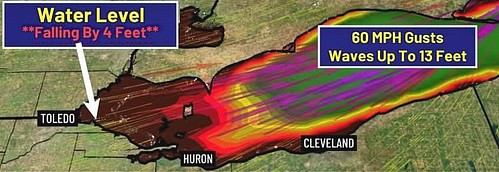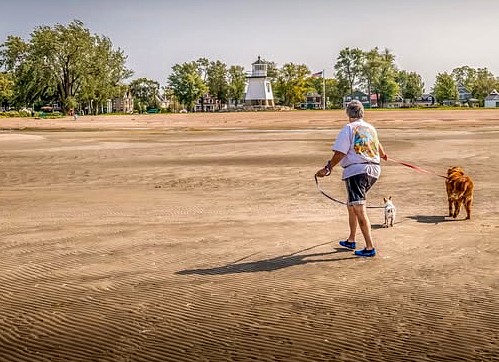Escaping
the Pi-hahiroth Trap
Written
May 20, 2021
 Welcome
back to IT'S IN THE BIBLE. I'm Brother Billy.
Welcome
back to IT'S IN THE BIBLE. I'm Brother Billy.
On today's program, we're honored to have two guests, one from 1440 BC and the other from modern times.
First, here's a woman from ancient Egypt. She actually showed Moses how to lead the people of Israel across the Red Sea! I'd like to welcome Sinerhet.
Thank you, sir. It's amazing to have traveled so far into the future to be here with you today. How long has it been, more than three and a half millennia?
Something like that. And we also have a hydrologist with us from the present-day Canadian province of New Brunswick. Here is Dr. Gordon McVand.
Hello, Billy. And hello... Sinarhat, is it? I bring both of you greetings from the Bay of Fundy.
Thank you, Dr. McVand. We'll get back to you shortly.
First though, Sinerhet, we're told that when the Israelites left Goshen on their journey from Egypt to the Promised Land, they didn't choose the direct route.
That's what I understand.
The shortest way would have been along the coast, east and then north, but there was a danger that warlike Philistines would have turned them back. Therefore they headed southeast instead, toward the Red Sea. They paused near your home town. Exodus 13:17~
|
Today that town is called Suez, but it had a different name in your day. How was it pronounced? Pie hah-high-rote. It's just east of Baal-zephon, between Migdol and the sea. Exodus 14:2~ |
|
“The sea” would be the Red Sea, am I correct?
Yes, the very northern tip of it. Farther north past Migdol is the Great Bitter Lake, and beyond that the Mediterranean. Someday all these waters ought to be connected by a canal.
Moses encountered one of those bitter lakes at Marah, I recall. IT'S IN THE BIBLE. Exodus 15:22-25 But before that, he led his people across the Red Sea.
|
|
Well, not the entirety of it, of course. It's 200 miles wide; he would have needed a whole fleet of boats for that! No, the north end of the Red Sea at Pi-hahiroth is merely a bay, only a mile from one side to the other. |
We've pointed to that little bay with a red arrow. And you say that's actually where Moses made the crossing to escape Pharaoh's army.
That's true. The Israelites had camped beside the water. I was asked to bring them things from town, some food and other provisions.
How could they pay for these goods?
By using barter. For some reason, they had extra clothes and jewelry with them. Exodus 12:35-36 I got a pair of silver earrings.
But suddenly, when we looked up, we saw that an army had surrounded the camp! There must have been 600 chariots and horses and cavalry and government troops. I heard that Pharoah was there personally in his royal chariot. It seems the Israelites were fugitive slaves, and Pharaoh wanted them brought back, dead or alive. Exodus 14:5-10~
The Israelites realized they were trapped between the water on one side and the army all around them, with no way to escape. What do we do when all else fails? We ask for divine intervention. So they prayed loudly to their god.
Also, they complained to Moses. “We're going to be slaughtered! Why did you bring us out here to perish in the wilderness? Was there a shortage of graves in Egypt? It would have been better to remain enslaved.” Exodus 14:11-12~
But Moses told them to have faith. And he asked God what he should do. Exodus 14:13-18~
Better yet, he asked me what to do. Fortunately, as a resident of Pi-hahiroth, I knew the secret of the bay. It was high tide then, but I explained to Moses that low tide was coming.
|
His brother Aaron had a big cauldron on wheels, filled with oil that burned day and night. He called it “The Angel of God.” His priests had tied ropes to it so they could pull it in front of the people to lead the way. Exodus 13:21-22~ But now instead, as night was falling, the priests relocated the Angel to the rear of the camp, between the people and their pursuers. A strong east wind came up and blew the smoke toward Pharaoh's soldiers. |
|
Also, it was cloudy, so nightfall came early. The smoke and the cover of darkness combined to hide the Israelites. As soon as the army could no longer see them, they broke camp.
And that was when the east wind blew the water back, and the seabed became dry land. Exodus 14:19-21~
No, the seabed was still soggy. But the waters did recede, as I knew they would. The bay next to Pi-hahiroth has an unusual shape, so the water sloshes around and causes very extreme tides.
Dr. McVand, let me turn to you. I understand you've observed this effect.
Yes, it's a rocking motion called a “seiche.” The frequency of the tides is one cycle every 12.4 hours. If a bay happens to have a similar natural period, the resonance reinforces the tides and makes them higher.
As much as 50 feet higher where you live in Canada, is that correct?
That is so. Here is a time-lapse video. And various places in the United States experience less extreme seiches a couple of times a year.

In western Ohio, strong winds from the southwest can push some of Lake Erie's water away from Toledo and toward Cleveland, emptying certain bays for several hours. Near the Port Clinton lighthouse, people and dogs can walk across the bottom of the Great Lake! If they were fleeing persecution when the seas parted, they would conclude that a higher power must be helping them.

Greg
Peiffer, September 5, 2025
And the tides behave like that at Pi-hahiroth, which is the present-day city of Suez?
They once did, though they were not as extreme as in the Bay of Fundy.
|
And today there's no seiche at all, because the seafloor has been dredged to accommodate the large ships that travel through there nowadays. It's the entrance to the Suez Canal, you know. |
|
So someone did build a canal!
Yes, that's true, Sinerhet. But on the night when the Israelites were camped there, trapped by the Egyptian army that we've indicated by a pair of red ankhs, you witnessed the water as it receded. That allowed the Israelites to escape as we've indicated by a yellow arrow.
They certainly did. Moses held out his hand to point the way, and the entire company quietly hurried across. They avoided the puddles to the left and right of them, and The Angel of God brought up the rear. They made it all the way across, into the dry wilderness of Shur. Exodus 14:21-22, 15:22~

And the Egyptian army didn't see them leaving?
They noticed that the fiery cauldron was moving. But not until morning did it become clear that all the people had escaped.
By then the tide was starting to come in again. The army tried to pursue the fugitives, but all those mighty chariots bogged down. Their wheels got stuck in the mud. From town, I could hear the soldiers shouting. They were in a panic, saying Israel's god was fighting against Egypt's gods, and Israel's god was stronger, and they had better get out of there. Exodus 14:23-25~
Then Moses held out his hand again and caused the water to return. Exodus 14:26-27~
I didn't see that part; he would have been on the far side by then. And, of course, the water did come back of its own accord.
IT'S IN THE BIBLE. Scripture tells us that as the water flowed back it covered all of Pharaoh's army, including the chariots and cavalry, and no one survived. It was another great miracle, similar to the Ten Plagues of Egypt! Exodus 14:28~
Maybe that's what the Israelites thought, but what I observed was a more orderly retreat. Many of the chariots had to be abandoned in the bay because their wheels were broken, but the men and most of the horses made it back safely to Pi-hahiroth. Pharaoh decided to call off the pursuit.
And bodies of dead Egyptians washed up on the shore. Surely that was an act of God, a miracle proving that the Israelites should remain faithful to the leadership of Moses. Exodus 14:30-31
To reinforce that idea, he commissioned a song. His sister took up her tambourine and danced to it, with all the women following her. "I shall sing to the Lord, for he hath risen up in triumph! Horse and rider he hath hurled into the sea." Exodus 15:1-12,20-2120~
Horse and rider, maybe, but what about the Israelites themselves? He hath hurled them into the wilderness. It's a very inhospitable desert with no landmarks. They must have been totally lost, aimlessly wandering around for weeks.
|
They wandered for 40 years. Joshua 5:6~ No! Hadn't Moses promised them a land “flowing with milk and honey?” Exodus 3:8 After 40 years, hardly any of the original group would have been alive to see it. |
|
And even after they crossed the Jordan River into Canaan, it was many more years before they reached their eventual capital, Jerusalem. There a psalmist wrote additional verses for the song, celebrating his nation's conquests of the local people living in Philistia and Edom and Moab and Canaan. Exodus 15:13-17~
They simply took the land they wanted?
It had been promised to them. So they simply killed the Canaanites and the others.
And they credited all of this to their loving god?
They did indeed. Deuteronomy 20:16-17 As the song concludes, “The Lord will reign forever and for ever.” Exodus 15:18~
Praise be unto him! IT'S IN THE BIBLE.
Click here for the list of IT'S IN THE BIBLE interviews.





